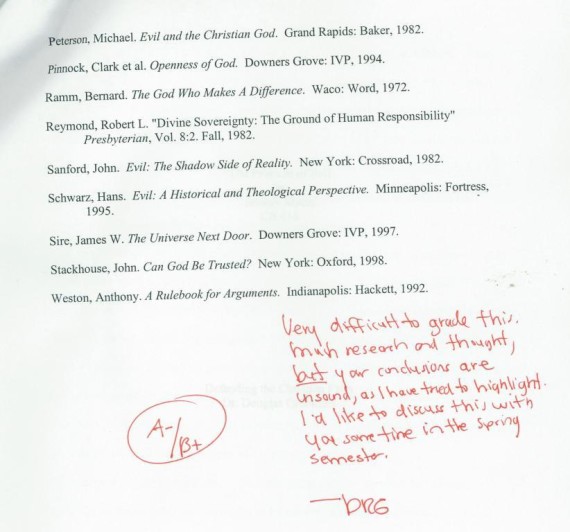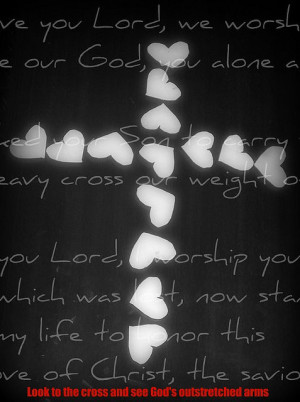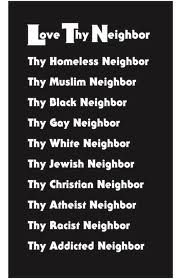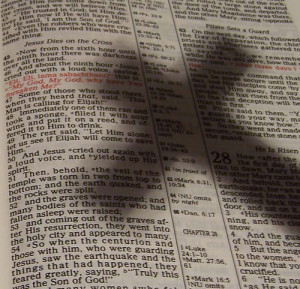I was thinking a bit more about the violence of God and the source of evil today (as these topics are consuming my thoughts recently), and I remembered a paper I wrote back in 1999 while at Denver Seminary for a class I had with Douglas Groothuis. It was on the nature and source of evil.
I was curious what I thought about this topic nearly fifteen years ago, so I waded through the files in a file cabinet I have lugged with me through fifteen moves, and miraculously, found the paper!
I remember thinking that my paper was “groundbreaking.” (What seminary student doesn’t think this about his every research paper?) When Dr. Groothuis gave my paper back to me, he gave me a good grade, but not because he agreed with me (he strongly disagreed). Instead, he graded me based on my research and thought process. (This, by the way, is one sign of a good professor… to grade based on research and thought, not based on whether or not the student agrees with the professor.)
Here is what Dr. Groothuis wrote on the last page of my paper:

Guess what I concluded in my paper?
I concluded much the same thing that I am writing about in my recent series on the violence of God in the Old Testament (see the link list at the bottom of this post). In my paper from 1999 I argued that although God did not cause evil, He is nevertheless somewhat morally responsible for it because He created a world where such evil is possible. The actual source of evil is within the free will of God’s creatures (humans and angels), and since these were gifts of God to His good creation, when these gifts were misused and abused to do things contrary to God’s will, evil resulted.




 As we seek to learn why bad things happen in this world, we are looking at several principles of a theological
As we seek to learn why bad things happen in this world, we are looking at several principles of a theological 
 The second principle of the
The second principle of the 
 As we try to understand the theology behind the idea that on the cross, Jesus reveals to us what God was doing in the Old Testament, we are in a section where we recognize that there are no “pat answers” to the problem of evil in the world, and that the situation is much more complex than most of us realize. I have about six points to a “
As we try to understand the theology behind the idea that on the cross, Jesus reveals to us what God was doing in the Old Testament, we are in a section where we recognize that there are no “pat answers” to the problem of evil in the world, and that the situation is much more complex than most of us realize. I have about six points to a “
 This post contains three more ways to develop friendships with your neighbors.
This post contains three more ways to develop friendships with your neighbors.  When we learned that our neighbor’s cancer had returned, we started spending time with her. When she told us that she wanted watermelon, we found a store that had watermelon in January. When she couldn’t keep down any food we made her lots of batches of “pear pudding,” the only thing she could keep down. We looked at her pictures with her and her husband – the church where they married, vacations they had taken, and other pictures from her life. We prayed with them. We tried to answer their questions about God. We sat by her bedside the night before she died. We hugged her every time we saw her. We cried with her, and then again with her husband after she passed.
When we learned that our neighbor’s cancer had returned, we started spending time with her. When she told us that she wanted watermelon, we found a store that had watermelon in January. When she couldn’t keep down any food we made her lots of batches of “pear pudding,” the only thing she could keep down. We looked at her pictures with her and her husband – the church where they married, vacations they had taken, and other pictures from her life. We prayed with them. We tried to answer their questions about God. We sat by her bedside the night before she died. We hugged her every time we saw her. We cried with her, and then again with her husband after she passed.
 I
I  And let me tell you, he NAILED it. He basically said the same thing I have been saying in my series on this blog.
And let me tell you, he NAILED it. He basically said the same thing I have been saying in my series on this blog.
 Before we can look at specific Bible passages regarding the violence of God in Scripture, it is important to develop a framework which helps us understand what is going on within and behind these violent texts. I have six points of this framework, which I call “
Before we can look at specific Bible passages regarding the violence of God in Scripture, it is important to develop a framework which helps us understand what is going on within and behind these violent texts. I have six points of this framework, which I call “
 So before we look at any specific passages, I want to briefly present a framework for how to understand what is going on behind many of the violent and destructive passages in Scripture. In this post I will present the basic framework, and in the following couple of posts I will present what I call the “Six Principles of Chaos Theory.” Only then will be well prepared to begin looking at some of the violent texts of Scripture to see how they do not reveal a violent and bloody God, but a God that looks surprisingly like Jesus Christ.
So before we look at any specific passages, I want to briefly present a framework for how to understand what is going on behind many of the violent and destructive passages in Scripture. In this post I will present the basic framework, and in the following couple of posts I will present what I call the “Six Principles of Chaos Theory.” Only then will be well prepared to begin looking at some of the violent texts of Scripture to see how they do not reveal a violent and bloody God, but a God that looks surprisingly like Jesus Christ. Thankfully, this is not the God that created the world, nor is it the God portrayed in Scripture, nor especially is it the God revealed in Jesus Christ. The true God, the God who created heaven and earth, the God of Abraham, Isaac, and Jacob, the God who raised up Kings and Prophets in Israel to carry His message, the God ultimately revealed in Jesus Christ, and carried now by the Spirit through His Church, is a God of infinite love, mercy, compassion, forgiveness, long-suffering, patience, kindness, and grace. This is the God who desires a relationship with each person on earth.
Thankfully, this is not the God that created the world, nor is it the God portrayed in Scripture, nor especially is it the God revealed in Jesus Christ. The true God, the God who created heaven and earth, the God of Abraham, Isaac, and Jacob, the God who raised up Kings and Prophets in Israel to carry His message, the God ultimately revealed in Jesus Christ, and carried now by the Spirit through His Church, is a God of infinite love, mercy, compassion, forgiveness, long-suffering, patience, kindness, and grace. This is the God who desires a relationship with each person on earth. An analogy might be helpful. You probably remember the scene from “Jurassic Park” where the wild-eyed scientist, Dr. Ian Malcom, talks about “chaos theory” and illustrates it by watching drops of water roll off his knuckle. He shows that even though the drop of water lands in the same place each time, it rarely goes in the same direction.
An analogy might be helpful. You probably remember the scene from “Jurassic Park” where the wild-eyed scientist, Dr. Ian Malcom, talks about “chaos theory” and illustrates it by watching drops of water roll off his knuckle. He shows that even though the drop of water lands in the same place each time, it rarely goes in the same direction. How can a God who says "Love your enemies" (Matthew 5:44) be the same God who instructs His people in the Old Testament to kill their enemies?
How can a God who says "Love your enemies" (Matthew 5:44) be the same God who instructs His people in the Old Testament to kill their enemies?

 There are numerous ways of doing this, but let me mention just seven that have worked well for my wife and I as we seek to build relationships in our neighborhood. This post will contain the first four, and the next post in this series will contain the final three.
There are numerous ways of doing this, but let me mention just seven that have worked well for my wife and I as we seek to build relationships in our neighborhood. This post will contain the first four, and the next post in this series will contain the final three.  On other occasions we walked by neighbor’s houses and saw water running out of the house from under the garage door or front door. This indicates a broken water pipe indoors and a flooded house. After determining that no one is home, we try to find a neighbor with a large wrench so we can turn the water off at the street, or I run home to find such a wrench. After the water is off, we try to contact a neighbor who can reach the homeowner so they can return home to start the massive cleanup. At least three times the homeowners have later told me that our quick action saved them thousands of dollars in damages and prevented them from having to move out of the house while it was being repaired.
On other occasions we walked by neighbor’s houses and saw water running out of the house from under the garage door or front door. This indicates a broken water pipe indoors and a flooded house. After determining that no one is home, we try to find a neighbor with a large wrench so we can turn the water off at the street, or I run home to find such a wrench. After the water is off, we try to contact a neighbor who can reach the homeowner so they can return home to start the massive cleanup. At least three times the homeowners have later told me that our quick action saved them thousands of dollars in damages and prevented them from having to move out of the house while it was being repaired.